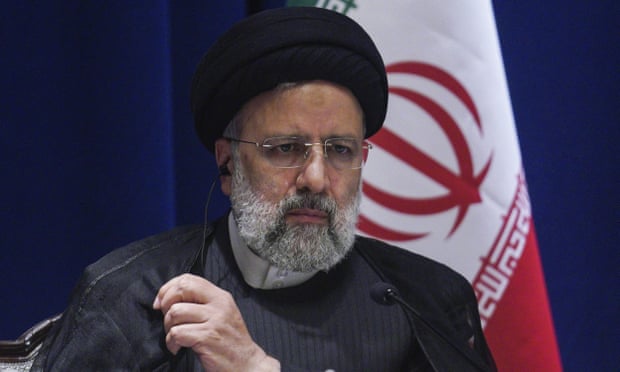[ad_1]
The death in custody of an Iranian woman that has sparked widespread protests must be “steadfastly” investigated, Iran’s president has said, even as he lamented what he claimed were western “double standards” on human rights.
Ebrahim Raisi told a news conference on the sidelines of the UN general assembly that the death of Mahsa Amini while in the custody of the morality police “must certainly be investigated”.
“I contacted her family at the very first opportunity and I assured them we would continue steadfastly to investigate that incident … Our utmost preoccupation is the safeguarding of the rights of every citizen.”
Of Amini’s death, he said authorities were doing what they needed to do and that responsibility now lay in the hands of the judiciary.
At least 31 people are feared by rights groups to have died in six days of protests, sparked by the death on 16 September of the 22-year-old Kurdish woman.
On Thursday, protesters torched police stations and vehicles in several cities, and Iran shut off the internet in parts of Tehran and Kurdistan, and blocked access to platforms such as Instagram and WhatsApp, in an attempt to curb a growing protest movement.
Iranian women have taken to the streets and the internet to burn their headscarves and cut their hair.
Amini was detained for allegedly wearing a hijab headscarf in an “improper” way. Activists said the woman, whose Kurdish first name is Jhina, had suffered a fatal blow to the head, a claim denied by officials, who have announced an investigation. Police continue to maintain that she died of natural causes, but her family suspect that she was subjected to beating and torture.

On Thursday, Raisi sought to turn the tables on the country he was visiting by asking about police shootings in the US. “Did all these deaths get investigated?” he said.
The scope of Iran’s ongoing unrest, the worst in several years, still remains unclear as protesters in more than a dozen cities – venting anger over social repression and the country’s mounting crises – continue to encounter security and paramilitary forces.
Raisi, who addressed the general assembly formally on Wednesday, said bad things happened to people at the hands of authorities everywhere, making vague references to the US and UK. He called for the “same standard” around the world in dealing with such deaths at the hands of authorities.
Raisi’s comparison reflects a common approach by Iranian leaders, who when confronted with accusations of rights violations often point to western society and its “hegemony” and demand that those nations similarly be held accountable.
Raisi, who led the country’s judiciary before becoming president, said the inquiry into Amini’s death ultimately rested there.
The protests have grown into an open challenge to the government, with some Iranians calling for the downfall of the Islamic Republic itself. They are the most serious demonstrations since 2019, when protests erupted over a government hike in the price of gasoline.
While not outright condemning the protests, Raisi said: “What is occurring, having demonstrations … of course these are normal and fully accepted … We must differentiate between demonstrators and vandalism. Demonstrations are good for expressing specific issues.”
The US imposed sanctions on the morality police and leaders of other Iranian security agencies on Thursday, saying they “routinely employ violence to suppress peaceful protesters”.
With Associated Press
[ad_2]